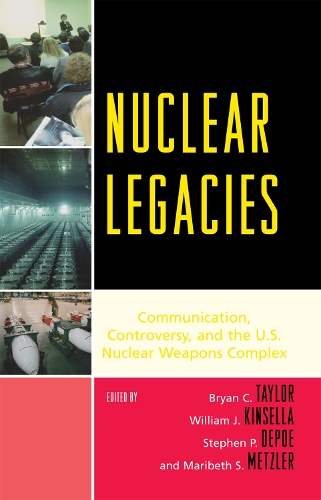
Nuclear Legacies: Communication, Controversy, and the U.S. Nuclear Weapons Complex
(Paperback)
Publishing Details
Nuclear Legacies: Communication, Controversy, and the U.S. Nuclear Weapons Complex
By (Author) Bryan C. Taylor
Edited by William J. Kinsella
Edited by Stephen P. Depoe
Edited by Maribeth S. Metzler
Contributions by Jennifer Duffield Hamilton
Contributions by Jason N. Krupar
Contributions by Laura A. McNamara
Contributions by Eric L. Morgan
Contributions by Jay Mullen
Contributions by Tarla Rai Peterson
Bloomsbury Publishing PLC
Lexington Books
29th April 2008
United States
Classifications
General
Non Fiction
Nuclear weapons
363.738
Physical Properties
Paperback
276
Width 153mm, Height 230mm, Spine 21mm
408g
Description
Although the Cold War is commonly considered 'over,' the legacies of that conflict continue to unfold throughout the globe. One site of post-Cold War controversy involves the consequences of U.S. nuclear weapons production for worker safety, public health, and the environment. Over the past two decades, citizens, organizations, and governments have passionately debated the nature of these consequences, and how they should be managed. This volume clarifies the role of communication in creating, maintaining, and transforming the relationships between these parties, and in shaping the outcomes of related organizational and political deliberations. Providing various perspectives on nuclear culture and discourse, this anthology serves as a model of interdisciplinary communication scholarship that cuts across the subfields of political, environmental, and organizational communication studies, and rhetoric.
Reviews
The volume's emphasis on communicative processes, especially in institutional settings, is a valuable contribution to study of the post-cold war period.... Combining institutional and technical history with rhetoric, communication, and anthropology generates a fascinating mix that deserves the attention of historians of technology. -- Dr. Sonja D. Schmid, assistant professor, Dept. of Science and Technology in Society, Virginia Polytechnic Institute and State University
Nuclear Legacies offers a timely and powerful reminder that the ways we talk aboutor avoid talking aboutnuclear weapons are often as important as the continuing presence of nukes in our world. This book greatly advances our understanding of how rhetoric, myth, and memory operate in one of the most pressing issues facing the planet today. -- George Cheney, Kent State University
Author Bio
Bryan C. Taylor is associate professor of communication at the University of Colorado-Boulder.
Stephen P. Depoe is associate professor in the Department of Communication at the University of Cincinnati, where he also directs the Center for Health and Environmental Communication Research.
William J. Kinsella is a faculty member in the Department of Communication and the interdisciplinary program in Science, Technology, and Society at North Carolina State University.
Maribeth S. Metzler is associate professor and director of the public relations program at the University of Cincinnati.
